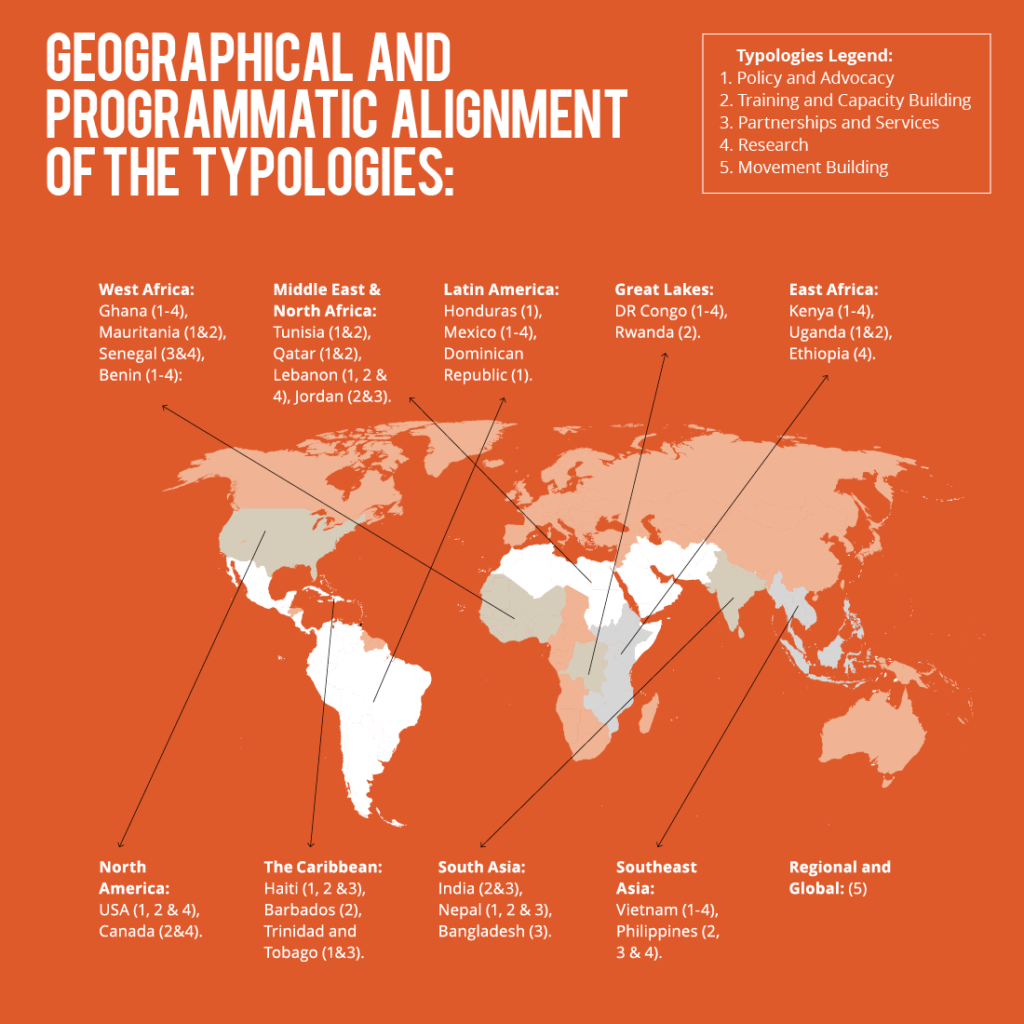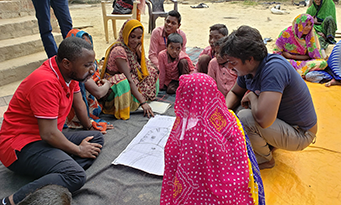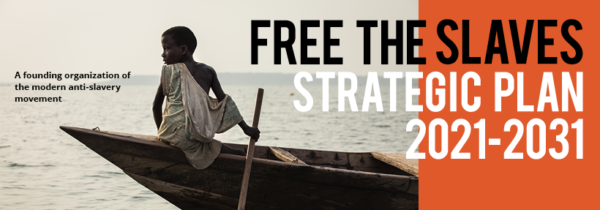Read the Full Plan: English | French | Spanish | Arabic
Read the Summary: English | French | Spanish | Arabic
Global Causes | Local Solutions
There are more than 49 million victims of modern slavery globally, of which more than 55 percent are trapped in situations of forced labor. Modern slavery arises as a result of economic, social, cultural, and legal conditions that create a state of vulnerability in which those who are enslaved find themselves. These conditions are in part due to global trends related to poverty, climate change, war and conflict, globalization, migration, and other serious human rights violations, including the violation of social and economic rights.
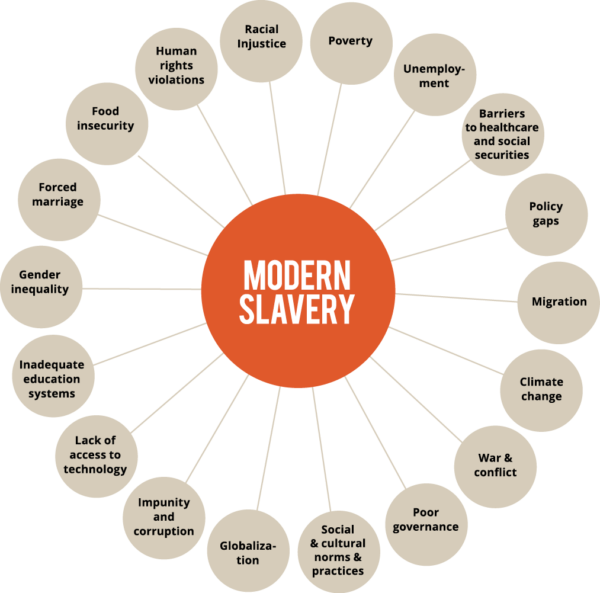
Our plan is to align our work and the anti-slavery movement with United Nations Sustainable Development Goals that address these global trends, and help communities and neighborhoods chart paths toward freedom by ending – at a local level – the conditions that allow modern slavery to exist. Our strategy will help community leaders build resilience to these global pressures, and resist traffickers who target the vulnerable.
Target groups for outcomes:
- Populations living in poverty or in marginalized communities with little or no presence of social services
- Survivors, especially women and girls, young people, and children
- Discriminated classes/castes, ethnicities, and races at the lower end of social hierarchies
- Displaced populations, undocumented migrants, and refugees
- Public officials, members of grassroots organizations, and movement partners that seek innovative ideas and solutions to end modern slavery
The strategy is based on key principles of effective anti-slavery interventions:
- Communities have the ability to change their conditions when equipped with appropriate knowledge, tools, and skills, are mobilized and are supported by allies and partners.
- Context-specific and locally owned solutions are the bedrock of the movement to end modern slavery; without them, ending modern slavery is impossible.
- Local, national, and global coalitions are vital to ending the multiple conditions that allow modern slavery to persist.
- National and global movements against modern slavery with input from community members (including victims and survivors) can be enabled.
- Survivors are fully engaged and actively participating in the movement against modern slavery, from the community to the global level.
General Objective Areas
Community Engagement:
For the first General Objective Area (Community Engagement), the rationale is that community organization is a necessary condition to take action, raising awareness, mobilizing, building knowledge, and changing attitudes and behaviors that are deeply ingrained in traditional patriarchal norms, as well as strengthening the role of local services to prevent and resist modern slavery.
Policy and Advocacy:
The second General Objective Area (Policy and Advocacy) contains indicative statements that refer to FTS’ actions related to the alignment of policies with international standards. We also underline policy implementation and law enforcement (which includes dealing with corruption and impunity) and take into consideration that the latter cannot be done if there are not the necessary budgetary allocations. These dimensions (implementation, enforcement, and budgeting) go a long way in the effort to address the issue of the policy gap when policies are enacted but never acted on.
Movement Building:
The third General Objective Area (Movement Building) aims at keeping FTS in a leadership position within CSO coalitions and representing them in Alliance 8.7 and ATEST (Alliance to End Slavery and Trafficking). It means keeping up the support and potentially expanding its capacity to fund field partner organizations. Importantly so, is the role of FTS in sharing its experience with U.S.-based partners who exercise influence on the U.S. Congress and executive branch agencies that are in charge of combating modern slavery. The Freedom from Slavery Forum is a unique space for CSOs, led by FTS to create opportunities for networking, learning and sharing, actionable commitments, and engagement.
Learning Initiatives:
The fourth General Objective Area (Learning Initiatives) presents an opportunity for FTS to strategically change the conditions that allow modern slavery to persist in local communities by exploring new programmatic initiatives that can enhance organizational effectiveness and learning, support the movement, or tackle some pressing issues that require FTS involvement. This area specifically includes, but is not limited to, exploring the issue of human trafficking in American Indian and Alaska Native communities as well as the nexus between racial justice and modern slavery in the United States and beyond.
Our theory of change integrates community engagement with advocacy, movement-building, and learning initiatives at the local, national and international levels. We seek to influence the U.S. government, U.N. agencies, regional multilateral institutions, and others. We will continue to convene colleagues and partners in the anti-slavery movement to generate stronger collective action. We will research and innovate new techniques for confronting modern slavery.
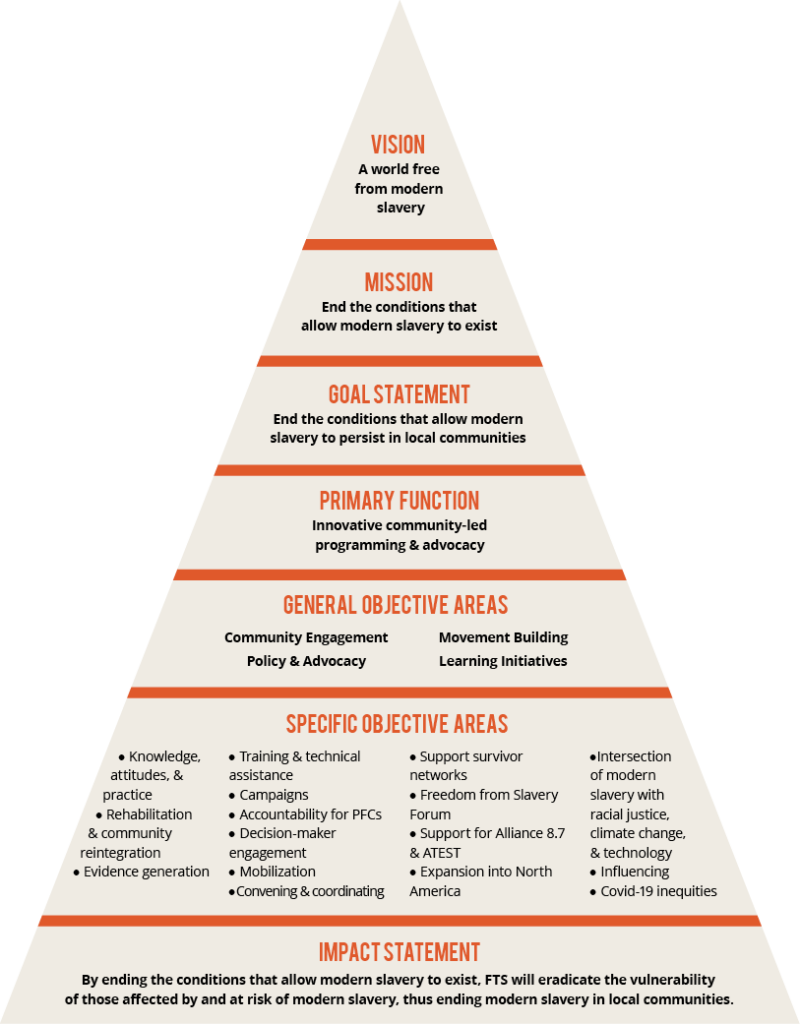
Programs | Expanding our Footprint
- Policy and Advocacy: Ensuring transparency and accountability for pathfinder country commitments and action plans to achieve U.N. Sustainable Development Goal 8.7, and influence change at local and global levels.
- Training and Capacity Building: By providing targeted and tailored training and technical assistance, FTS seeks to equip grassroots organizations with the knowledge and skills required to respond to gaps in modern-day slavery response from the community to the national level.
- Partnerships and Services: In partnership with grassroots organizations, FTS delivers an optimal mix of evidence-based, locally driven interventions, including service delivery, that fits each community’s unique needs.
- Research: Through community-based, participatory research, FTS combines knowledge and action to improve responses to modern slavery, primarily at the local level, and ensure that the voices of community members and survivors play a critical role in shaping programming and policy agendas at local and global levels.
- Movement Building: Lead and provide space for the movement through coordination, engagement, and action of key stakeholders, especially civil society organizations.
